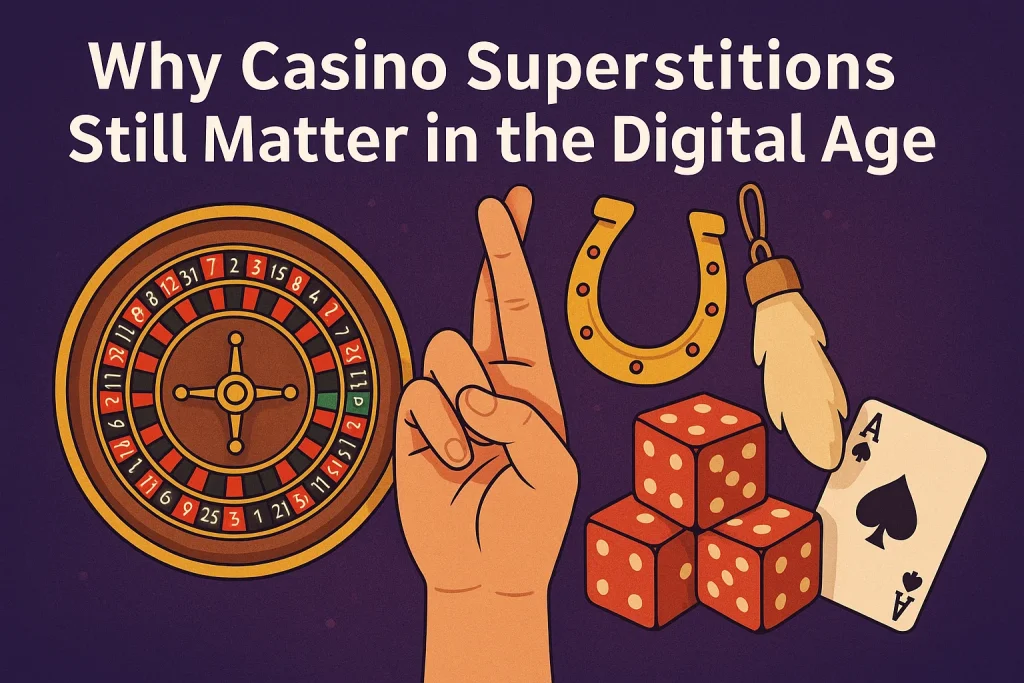
Walk into any traditional casino, and you’ll notice something curious: players clutching lucky charms, avoiding certain numbers, or sticking to a particular seat as if their entire fortune depends on it.
But what about today’s world of online casinos in Malaysia, where the environment is purely digital? Surprisingly, those same rituals and superstitions still thrive — even when no physical dice, cards, or tables exist.
Why do superstitions remain so powerful in the digital age of gambling? Let’s dive into the fascinating psychology behind them.
The Long History of Gambling Rituals
Superstitions in gambling are not new. From ancient Chinese dice games to European card houses, players have always leaned on rituals to feel protected against chance.
In Asia, the number 8 is seen as lucky, symbolizing prosperity.
In Western cultures, crossing fingers or knocking on wood often precedes a risky bet.
Many players refuse to enter a game during the middle of a streak, believing it disturbs the flow of luck.
These rituals aren’t just cultural quirks; they provide a sense of order in a game ruled by randomness.
Why Players Still Believe in Luck Online
At first glance, superstitions shouldn’t survive online. There’s no dealer shuffling cards in front of you, no dice rolling across the felt. Yet, many players still:
Wear the same “lucky shirt” before logging in.
Choose usernames with lucky numbers.
Start games only at “good” times, such as 11:11 or after midnight.
Tap their screens before pressing spin on slots.
Why? Because rituals are less about the environment and more about control over uncertainty.
The Psychology of Superstitions
Superstitions act like mental safety nets.
Illusion of Control
When outcomes are random, players crave something that feels predictable. A ritual gives that illusion.
Reducing Anxiety
Betting real money is stressful. Superstitions lower that stress by creating a sense of routine.
Emotional Comfort
Even if players know logically that touching a charm won’t change results, the action itself provides reassurance.
Digital Age, Same Beliefs
The rise of online gambling hasn’t killed superstitions — it has transformed them.
Instead of carrying a rabbit’s foot, players now choose lucky avatars or profile icons.
Instead of whispering to cards, they might whisper to their screens.
Some avoid playing on “unlucky” dates, while others swear by certain times of the day for big wins.
Superstitions evolve, but the belief in luck remains.
Regional Flavors: Malaysia and Beyond
In Malaysia, cultural diversity means players bring unique rituals into online casinos:
Chinese Malaysians may focus on auspicious numbers like 8, or avoid 4, which sounds like “death” in Chinese.
Malay players may lean on prayers before big games, seeking spiritual calm.
Indian Malaysians may favor certain colors, like gold and red, tied to prosperity and celebration.
These traditions add a cultural depth to the otherwise uniform experience of online play.
Do Superstitions Actually Work?
Here’s the twist: while superstitions don’t influence the outcome of games driven by RNGs (Random Number Generators), they do influence how players feel.
A calm, confident player may make better decisions in strategy-based games like baccarat or poker.
Rituals can prevent impulsive actions by slowing down decision-making.
The feeling of being “lucky” can boost morale and enjoyment, even if it doesn’t change probability.
Why Superstitions Will Never Disappear
At their core, superstitions are not about logic — they are about human nature. Gambling is uncertain, unpredictable, and thrilling. Superstitions add an extra layer of meaning, making every bet feel like part of a bigger story.
Whether it’s kissing a lucky coin, choosing a certain number, or waiting for the “perfect time” to press spin, these rituals transform games into personal experiences.
And that’s why, even in the digital age, superstitions are here to stay.
Conclusion
In Malaysia and beyond, gambling isn’t just about numbers and probabilities. It’s about emotion, culture, and tradition. Superstitions may not influence the algorithms behind online games, but they influence the people who play them — and that makes them powerful in their own right.
So next time you see someone tap their phone before spinning the slots or refuse to start a baccarat game until their clock strikes 8:08, remember: it’s not about math, it’s about meaning.

Conclusion
Chasing losses isn’t just about wanting to win money back — it’s about emotions, psychology, and how the human brain reacts to stress and reward. Understanding this can help players become more aware of their behavior and create better boundaries when it comes to gambling.
Knowing when to walk away isn’t a weakness — it’s a strength that comes from understanding how the game affects not just your wallet, but your mind.
